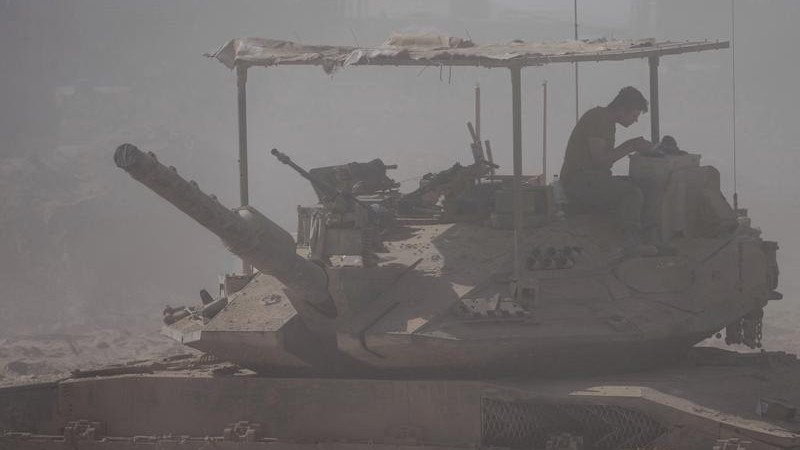THE WASHINGTON POST: Israel to raise budget by around $13 billion to cover war costs
THE WASHINGTON POST: Israel’s cabinet has agreed to raise this year’s budget significantly to cover costs related to the ongoing conflict in Gaza.

Israel’s cabinet agreed to increase this year’s budget to cover costs related to the war with Iran in June and ongoing fighting in Gaza against Hamas.
The upward revision - just five months after the previous budget was signed off by parliament - underlines the heavy toll Israel’s 22-month, multi-front war has taken on the country’s economy, which unexpectedly contracted in the second quarter.
The 2025 budget will be raised - pending parliamentary approval - by more than 30 billion shekels ($13 billion). That is equivalent to 1.5 per cent of GDP, according to a finance ministry statement on Tuesday. The target budget deficit will be raised to 5.2 per cent of GDP from the current 4.9 per cent.
Sign up to The Nightly's newsletters.
Get the first look at the digital newspaper, curated daily stories and breaking headlines delivered to your inbox.
By continuing you agree to our Terms and Privacy Policy.The move comes as Israel prepares to intensify its military campaign in Gaza, a bid to destroy Hamas’s remaining strongholds in the Palestinian territory.
Prime Minister Benjamin Netanyahu authorized an advance by ground troops on Gaza City, the de-facto capital, earlier this month, having previously skirted much of the area out of concern for hostages the government believes are held captive there.
The decision has been criticized by some of Israel’s main allies in Europe and many Israelis, with both groups saying Netanyahu should seek a ceasefire immediately to help end a war that’s devastated Gaza.
Hamas, designated a terrorist organization by the US and other governments, on Monday said it had agreed to a new ceasefire plan put forward by Egypt and Qatar, two key mediators. Israel has yet to respond. If it accepts the latest proposal - which follows many others that have been rejected by one side or the other this year - the Gaza City offensive would probably be put on hold or scrapped.
Lion’s Share
The lion’s share of Israel’s additional spending – 28.9 billion shekels – will be allocated to defence, swelling the budget’s single-largest item to 140 billion shekels, according to a draft resolution seen by Bloomberg.
That’s roughly twice the amount Israel was envisaging spending before the war broke out with Hamas’s attack on Oct. 7, 2023.
Roughly 1.6 billion shekels is meant for the operations of the Gaza Humanitarian Foundation, a controversial aid distributor set up earlier this year after Israel stopped United Nations agencies for distributing supplies to Palestinians. Some of Netanyahu’s far-right ministers, including Itamar Ben Gvir, said Israel should not be funding aid supplies.
Another 1.7 billion shekels will be put aside for interest payments, with the finance ministry saying “the additional expenditure for 2025 will affect the scope of government debt.”
Israel’s debt has surged since the multi-front conflict started and it’s been downgraded several times. Still, it retains a rating of A from S&P Global Ratings, the same as Spain and just one level below Japan.
Israel said last month it would boost defence expenditure by 42 billion shekels over the next two years, without providing a breakdown. The extra cash includes funds needed to cover Israel’s exchange of missiles with Iran in June, waged in an attempt to destroy the Islamic Republic’s nuclear capabilities.
Israel’s finance ministry said state revenues this year have exceeded expectations, ameliorating the impact of additional defence spending and other policies on the budget deficit, according to the resolution. Even so, it’s announced a 3.35 per cent cut for all government ministry budgets next year.
The cabinet meeting was a day before a Bank of Israel interest rate decision. Monetary policymakers are expected to hold the key interest rate at 4.5 per cent for a 13th consecutive time on Wednesday.
The central bank - which regularly monitors and cites the “risk premium” attached to Israel because of the conflict - will weigh the economic slowdown against war-related price pressures. Annual inflation is 3.1 per cent, still above the country’s target of 1 per cent to 3 per cent.
The bank has previously signalled that it would be ready to lower rates in the second half of 2025, though that was before the war with Iran broke out and the plans for Gaza City were announced.
© 2025 , Bloomberg
